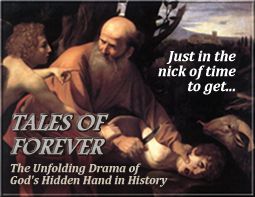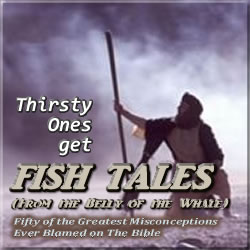The Neglected Naturalist
An Unlikely Ally in the Search for Intelligent Life
The first thing one discovers when studying history, and the processes that contribute to its unfolding, it is at best a capricious and illusive endeavor. More often than not the layers of conflicting reports make the uncovering of historical fact more like an archeological dig as opposed to a straightforward inquiry into the obvious. Often the original eyewitness accounts, so integral to any investigation, are far and few between, if not altogether missing, leaving even the most enthusiastic seeker empty-handed and discouraged. No wonder pessimists and detractors alike are so quick to dismiss attempts into the acquisition of anything even remotely resembling historical certainty. No wonder the lives of the great pioneers of human endeavor have remained in the shadow of obscurity, in danger of being lost forever to those who seek to know more about our forgotten heroes of history.
One reason for this dismal state of affairs is because, for most of our history on this planet, many of the relevant resources that provide a window into the lives of past generations have only been available to a small segment of the public. Only scholars or the very rich previously had access to the books written by these individuals. As a result, the only knowledge available to the general public has been one that has been edited according to the particular frame of reference of the elite core of those “in the know,” as it were. Prior to the democratization of knowledge—facilitated through such vehicles as the Internet—the truth of history has always been whatever the “powers-that-be” wanted us to know. As the old adage has stated: “History is nothing more than his-story,” which is to say, whoever won the war, whoever controls the means of productivity, whoever controls the power of the media, that is the one who writes the history as we have come to know it.
But thankfully, in the wake of the digital age, new avenues in our quest to unearth the truth concerning these neglected ones are continually being made available to us. As the Information Age continues to mature, the ancient paradigm is being swept away by this digital tidal wave, in the form of a uniquely personal acquisition of knowledge. As a result of this revolution, an unprecented access to the library of the ages has laid bare the truth about past lives and events, spilling its priceless contents into the streets for all to see. No longer the prize of the intellectual and economic elite, many of the books—written by the very ones who forged history—are now available for anyone to judge for themselves, so like never before one can hear the voice of truth echo down through the corridors of history.
Such is the case with an unlikely candidate to be heralded as a hero on this website, yet because of this new avenue of historical truth, this man has found his way here nonetheless. A man of science, this forgotten one was a nineteenth-century British naturalist, explorer, geographer, anthropologist, and biologist. But what is most significant about this man is that, according to the scientific establishment of which he was a part, the credit due him for his role as co-founder of their most beloved theory was lost to history for nearly half a century, and by most accounts, the man himself was shunned by the very establishment to which he had contributed his world-altering theories. The individual in question is one Alfred Russel Wallace, a man who, by all accounts provided the stimulus for Charles Darwin to publish, in 1859, his first book on the subject of evolution. As the story goes, four years before Darwin went to press with his On the Origin of Species, Russel published his paper entitled On the Law Which has Regulated the Introduction of New Species, in Annals and Magazine of Natural History, in which he developed the principles of both divergence and natural selection.
Story Continues Below
To hear Kent and Zen Garcia talk about correcting biblical misconceptions, from June 23rd, 2021, CLICK BELOW.
Story Continues From Above
And to perfectly illustrate my point on the impact of the Internet, I would like to offer the following statement provided by Marzieh Ghiasi, in a series of illuminating excerpts from her website, A Sea Change:
This paper (on the Introduction of New Species) examined the geographical divisions of animals throughout lands and formulated the setting for evolution, (in terms of) the where and the when (of evolutionary development).1 In support of his paper, Wallace provided charts and meticulous observational recordings; the formulation was by all accounts innovative and laid the groundwork for evolutionary theory. It was later described as a “powerful essay” by the British biologist, naturalist, and paleontologist who coined the term agnostic, Thomas Henry Huxley2, one which brought Wallace into “the center of the Victorian evolutionary maelstrom.”3 However, at the time of its publication there was not much reaction to the paper, which surprised Wallace.
Despite the subdued reaction, both Darwin and Britain’s foremost geologist of the day, Charles Lyell, had actually read Wallace’s essay. Although Darwin himself held that his views had not been influenced by Wallace, the formulation of the divergence principle, which Darwin himself had not quite worked out, may have at the very least helped Darwin synthesize his ideas. Then, in May of 1857, Darwin corresponded with Wallace regarding Wallace’s 1855 publication in the Annals stating positively that “we have thought much alike and to a certain extent have come to similar conclusions… I agree to the truth of almost every word of your paper…”4 Later in the letter, Darwin mentioned his own book, which he anticipated would be published in two years’ time. Some authors have viewed this as a move to intimidate Wallace5 or to establish priority.6
While this may have been the case, as Darwin’s close friends were urging him to establish priority, other correspondences between the two reveal an amicable and supportive relationship. In response, Wallace sent a letter to Darwin inquiring about the progress on his book, expressing his own discouragement at having received so little reaction for his own article in the Annals. Darwin wrote back to him in December of 1857 with words of encouragement that “you must not suppose your paper has been entirely unattended to, for two very good men, Sir C. Lyell and Mr. E. Blyth of Calcutta, have especially called my attention to it.”7
According to all accounts, it was this correspondence between Wallace and Darwin which ultimately provided the catalyst for the latter to finally publish his own theories on the subject of evolutionary development, theories which Darwin had been struggling to coalesce and bring to some kind of fruition, having wrestled unsuccessfully with the problem for some two decades, not to mention the fact of his fear of reprisal and recrimination from the presiding Victorian establishment if he were to bring his ideas to publication. All these pitfalls, however, seemed inconsequential to a man like Darwin in the face of the possibility that Wallace, a merely self-taught naturalist and unassuming specimen collector, might eclipse his claim as progenitor of evolutionary thought. As geneticist Steven Jones put it, “Wallace’s letter gave Darwin a good kick up the backside. He had prevaricated for twenty years and would have done so for another twenty if he hadn’t realized someone else was on the trail.”
By the summer of 1858, Darwin was filled with the profound zeal of an evangelist hell-bent on success, as he finally found a way to organize his thoughts and express them as he had never before. “The end result,” says Robin McKie in a web edition of The Observer, “was On the Origin of Species by Means of Natural Selection, whose 150th anniversary was celebrated in 2009, along with the 200th anniversary of Darwin’s birth. Remarkably, it is the only major scientific treatise to have been written, deliberately, as a piece of popular writing, a book whose interlacing story lines have been compared with those of George Eliot or Charles Dickens and which is peppered with richly inventive metaphor. ‘Darwin was creating a lasting work of art,’ as Darwin’s biographer Janet Browne puts it.”8
As a result of the success of his book On the Origin of Species, Darwin came to be thought of as the sole originator of the theory of evolution, and Wallace eventually faded into the shadows of historical anonymity (in the same way that Alexander Graham Bell is considered the sole inventor of the telephone, while Elisha Grey was relegated to non-entity status). But how and why could such a thing happen? According to the facts of history, there was no animosity between the two men, who were by all accounts close friends and colleagues to the end of their days. In fact, Darwin never hesitated to address Wallace’s contribution to his own work in his endeavor to put forth his theories as expressed in his Origins. So why, exactly, has mainstream history forgotten the figure of Wallace, as though he never even existed? The answer, I believe, is not so mystifying when one considers the details of the life of this forgotten man, who, as it turns out, was so complex that to this day the recorded facts of history are yet to encapsulate his life into a neat and simple package. For as anyone who cares to investigate this mystery, the unraveling of historical fact and hearsay will ultimately reveal why a man like Alfred Wallace was swept aside by the scientific community, and, in the process of his dethronement from public awareness, was replaced in favor of the more politically correct figure of Charles Darwin.
Once again, we have the Internet to thank in trying to solve this mystery, because only by way of its vast repository of knowledge could we ever hope to unravel so many layers of historical disinformation. Certainly our mainstream school system has not bothered to rewrite any of its textbooks in an effort to set the record straight, and it is unlikely that they will ever do so in the near future. It therefore behooves us as thoughtful people to discover the truth for ourselves. Then, and only then, can we make up our own minds. So here are the facts as they can be ascertained from even a basic search on the Internet. Without too much effort at all, what one discovers is that as much as Wallace contributed to “the concept of evolution by way of natural selection,” he was just as prolific in terms of—as deemed by his colleagues, at least—his so-called “unscientific” worldview; because according to every account, it was Wallace’s belief that, as much as natural selection played a role in the development of the human species, there were also severe limitations to this process. And as everyone will freely admit, it was Wallace’s discourses on these limitations that lie at the heart of why the scientific establishment eventually felt it necessary to turn a blind eye on their fellow warrior as they sought to maintain the purity, as they saw it, of their beloved cause célèbre.
On this subject, nearly every website is unanimous in the recording of events: Whereas Darwin stressed the purely physical, mechanistic nature of evolution, Wallace rejected this oversimplified version, espousing the view that something beyond the merely natural world must have interjected itself into the process of the creation of life. According to Wallace, natural selection could not possibly account for mankind’s development of consciousness, with its capacity of speech, its capacity for morality and virtue, its capacity toward the artistic, mathematical, and metaphysical. All these things—which clearly distinguish humans from all other life forms—could only, said Wallace, have found their way into mankind’s makeup by way of “an unseen Universe of Spirit,” which had interceded in the history of human development. The first time was with the creation of organic life from that of inorganic matter. The second time occurred with the introduction of consciousness in the higher animals. And the third was the generation of the higher mental faculties in mankind. With no reservations whatsoever, Wallace explained it succinctly (courtesy of Michael Flannery, in his web article Don’t Mess with Alfred Russel Wallace, on the site Evolution News and Views):
Neither natural selection nor the more general theory of evolution can give an account whatever of the origin of sensational or conscious life. They may teach us how, by chemical, electrical, or higher natural laws, the organized body can be built up, can grow, can reproduce its like; but those laws and that growth cannot even be conceived as endowing the newly-arranged atoms with consciousness. But the moral and higher intellectual nature of man is as unique a phenomenon as was conscious life on its first appearance in the world, and the one is almost as difficult to conceive as originating by any law of evolution as the other. We may even go further, and maintain that there are certain purely physical characteristics of the human race which are not explicable on the theory of variation and survival of the fittest. The brain, the organs of speech, the hand, and the external form of man, offer some special difficulties in this respect…
This subject is a vast one, and would require volumes for its proper elucidation, but enough, we think, has now been said, to indicate the possibility of a new stand-point for those who cannot accept the theory of evolution as expressing the whole truth in regard to the origin of man. While admitting to the full extent the agency of the same great laws of organic development in the origin of the human race as in the origin of all organized beings, there yet seems to be evidence of a Power which has guided the action of those laws in definite directions and for special ends…
Such, we believe, is the direction in which we shall find the true reconciliation of Science with Theology on this most momentous problem. Let us fearlessly admit that the mind of man (itself the living proof of a supreme mind) is able to trace, and to a considerable extent has traced, the laws by means of which the organic no less than the inorganic world has been developed. But let us not shut our eyes to the evidence that an Overruling Intelligence has watched over the action of those laws, so directing variations and so determining their accumulation, as finally to produce an organization sufficiently perfect to admit of, and even to aid in, the indefinite advancement of our mental and moral nature.9
As can be expected, such statements as these caused tremendous consternation on the part of Wallace’s friend and colleague Darwin, who required no such mechanism of divine intervention in his view of natural selection’s role in the evolutionary process. When Wallace sent Darwin a copy of his review of Lyell’s Geological Evidences of the Antiquity of Man, written in 1863, in which Sir Charles’ final comments agreed in principle with Wallace’s view on the instigation of a higher power, Darwin was stunned, and, as a result, responded to his co-founder with these telling words: “I hope you have not murdered too completely your own and my child.”
Again and again, in a myriad of articles and books, Wallace unabashedly reiterated his views, even though he knew full well that they flew in the face of the latest and most fashionable trend of the scientific world in the latter half of the nineteenth century. And even though Lyell was said to have endorsed Wallace’s version of evolution, as opposed to Darwin’s, many others besides Darwin, who had once admired Wallace for his contributions to their scientific community were now at odds with the man who had, as they saw it, tainted their wonderfully self-regulating Universe with the unnecessary intrusion of a Deity—men like Thomas Huxley, as well as the British naturalist, Henry Bates, and most particularly Darwin’s closest friend, famed British botanist and explorer, Joseph Dalton Hooker. The final result of Wallace’s persistence was that of irreparable damage to his scientific reputation and that of his numerous personal relationships within the tightly knit community that had once embraced him for his special insights.
Still, Wallace was not completely exiled by the scientific community, which was so thoroughly indebted to his contributions. In his final years, Wallace was, however reluctantly on the part of his colleagues, feted with numerous awards, chairmanships, and presidencies. But after his death, in 1913, at the age of 90, it took little more than a decade for his memory to fade from public awareness. It would not be until the 1960s that the man and his accomplishments would finally be resurrected and, as a result, a reassessment of his unique views would cause his ideas to be seen in an entirely new light. Today, he is seen by many as having presaged the concept referred to as the “intelligent design” model, and many of its proponents are claiming Wallace as the godfather of their burgeoning movement. Whether they are rightly or wrongly justified in making such a claim, one can only imagine what the world would be like today had all of Wallace’s ideas been embraced by the scientific community instead of so many of them being swept under the proverbial rug in the almighty name of pure science. As one reviewer remarked, in praise of Michael Flannery’s book entitled Alfred Russel Wallace: A Rediscovered Life:
For too long, Alfred Wallace’s contributions to the science of evolution have been ignored or grossly mischaracterized. Why? Largely because he provided both a coherent criticism of Darwinism and a theist-friendly alternative to evolution. The secular intelligentsia sided with Darwin because Darwinism provided them with a view of evolution that handily eliminated God. They succeeded in making Darwinism the default view of evolution, both in history and biology textbooks. As a result, our understanding of the history of evolutionary theory and our understanding of evolution itself have suffered. Wallace’s account of evolution, if it had received a fair hearing, would have (I believe) won the day, and our views on evolution would be very different than they are today.10






